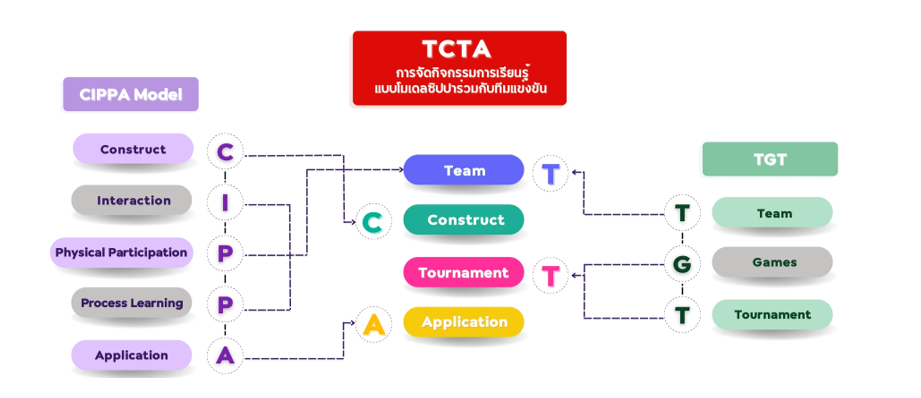Development of Mathematical Achievement, Mathematical Problem-Solving, and Work Commitment by Engaging in Learning Activities Using the CIPPA Model and TGT for Grade 8, Students
DOI:
https://doi.org/10.14456/jcct.2025.3Keywords:
Mathematical Achievement, Mathematical Problem-solving, Work Commitment, CIPPA Model, Team Games TournamentAbstract
This research aimed to 1) compare mathematical achievement before and after learning activities, 2) compare the mathematical achievement after learning activities with the 70% criterion, 3) study the mathematical problem-solving after learning activities, and 4) study the work commitment after learning activities. The sample consisted of Grade 8 students. Research instruments included lesson plans, mathematical achievement test, mathematical problem-solving test, and the questionnaire about work commitment. Data were analyzed by frequency, percentage, mean, standard deviation, and the t-test. The results found that: 1) Students had mathematical achievement after higher than before learning activities was significantly at the .05 level. 2) Students had mathematical achievement after learning higher than the 70% criterion was significantly at the .05 level. 3) Students had mathematical problem-solving skills after learning activities were at a very high level, followed by a good level, and a fair level, respectively. 4) Students had work commitment after learning activities was, overall, at the highest level.
Downloads
References
Chaichaowarat, R. (2023). Learning Experience Design (LXD) by Design Thinking. Charansanitwong Printing. (In Thai)
Jaithaing, A. (2007). Principle of Teaching (4th ed.). Odeon Store. (In Thai).
Jitchayawanich, K. (2022). 21st Century Learning Management Methods (3rd ed.). Chulalongkorn University Press. (In Thai)
Ketjusttujuck, J. (2019). Classroom Research: A Knowledge Creation Process for Teaching and Learning Development. Khon Kaen University. (In Thai)
Khaemmanee, T. (2021). Pedagogical Science: Knowledge for Organizing an Effective Learning Process (25th ed.). Chulalongkorn University Press. (In Thai)
Klaewkla, K. (2022). A Study on Learning Achievement in Mathematics on the Topic of Circles of Mathayomsuksa 3 Students by using CIPPA Model with KWDL technique. [Master's dissertation, Silpakorn University]. DSpace at Silpakorn University. http://ithesis-ir.su.ac.th/dspace/handle/123456789/4427. (In Thai)
Ministry of Education. (2017). Indicators and Core Learning Content in Mathematics (Revised Edition 2017). Cooperative Printing House of Thailand Limited. (In Thai)
Moohuana, P. (2018). The Development of Mathematics Learning Activity on the Topic of Money using CIPPA Instruction Model for Prathom Suksa 4. [Unpublished master's dissertation]. Rajabhat Maha Sarakham University. (In Thai)
Mooncome, S., & Mooncome, O. (2010). 19 Learning Management Methods: Develop Knowledge and Skills (9th ed.). Pappim Printing. (In Thai)
National Institute of Educational Testing Service. (2024). Statistics of the National Educational Test Results (O-NET). https://newonetresult.niets.or.th/AnnouncementWeb/Notice/FrBasicStat.aspx. (In Thai)
Office of Academic Affairs and Educational Standards. (2008). Guidelines for Developing Measurement and Assessment of Desirable Qualities According to the Basic Education Core Curriculum B.E. 2551. Cooperative Printing House of Thailand Limited. (In Thai)
Phuymat, N. (2020). The Development of Mathematics Learning Activities on Linear Equation with One Variable using Cooperative Learning with TGT Technique Emphasize Mathematical Problem Solving Process of Matthayomsuksa 1 Students. [Unpublished master's dissertation]. Udonthani Rajabhat University. (In Thai)
Pummarin, A. (2013). The Effects of CIPPA Model on Problem Solving and Mathematical Communication Abilities in Sequence and Series of Mathayomsuksa V Students. [Master's dissertation, Srinakharinwirot University]. DSpace Repository of Srinakharinwirot University. https://ir.swu.ac.th/xmlui/handle/123456789/4057. (In Thai)
Ruanruen, A. (2020). A Study on Learning Achievement in Mathematics by using Team Game Tournament Technique (TGT) for Integer of Matthayomsuksa 1 Students, Bannongked School [Master's dissertation, Silpakorn University]. DSpace at Silpakorn University. http://202.44.135.157/dspace/handle/123456789/3332. (In Thai)
Saelo, B. (2021). Mathematics Education: Learning for Life. Danex Inter Corporation. (In Thai)
Saikhong, S. (2017). The Effects of Cippa Model Learning Management on Mathematical Achievement and Problem Solving Ability of Mathayomsuksa 2 Students. [Unpublished master's dissertation]. Udonthani Rajabhat University. (In Thai)
Salam, A., Hossain, A., & Rahman, S. (2015). Effects of Using Teams Games Tournaments (TGT) Cooperative Technique for Learning Mathematics in Secondary Schools of Bangladesh. Malaysian Online Journal of Educational Technology, 3(3), 35–45.
Satya, S. P. (2013). The Effect of using Teams Games Tournaments on the Vocabulary Achievement of the Eighth Year Students of SMP Laboratorium Singaraja in Academic. Ganesha University.
Sinthapanon, S., Na Ranong, W., Sookying, F., Sangpirom, P., Makomon, S., Chumkot, J., & Napharat, P. (2002). Learning Process Organization: Emphasizing Learner-Centered Approach According to the Basic Education Curriculum. Aksorn Charoen Tat. (In Thai)
Slavin, R. E. (1990). Co-operative Learning: Theory, Research and Practice. Prentice Hall.
The Institute for the Promotion of Teaching Science and Technology. (2017). Handbook for Using the Mathematics Curriculum (Revised edition, B.E. 2017) According to the Basic Education Core Curriculum B.E. 2008. Ministry of Education. (In Thai)
Wiangwalai, S. (2013). Learning Management. Odean Store. (In Thai)
Wibulsri, Y. R. (2008). Measurement and Achievement Test Construction. Chulalongkorn University Press. (In Thai)
Wilson, J. W. (1971). Evaluation of Learning in Secondary School Mathematics: Handbook on Formative and Summative Evaluation of Student Learning. McGraw-Hill.

Downloads
Published
How to Cite
Issue
Section
Categories
License
Copyright (c) 2025 Journal of Computer and Creative Technology

This work is licensed under a Creative Commons Attribution-NonCommercial-NoDerivatives 4.0 International License.






























